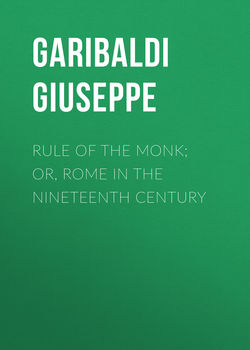Читать книгу Rule of the Monk; Or, Rome in the Nineteenth Century - Garibaldi Giuseppe - Страница 18
PART THE FIRST
CHAPTER XVII. RETRIBUTION
ОглавлениеJustice! sacred word, yet how art thou abused by the powerful upon earth! Was not Christ, the just one, crucified in the name of justice? Was not Galileo put to the torture in the name of justice? And are not the laws of this unjust Babel, falsely called civilized Europe, made and administered in the name of justice? Ay, in Europe, where the would-be industrious man dies of hunger, and the idle and profligate flaunt in luxury and splendor! – in Europe, where a few families govern the nations, and keep them in a chronic state of warfare under the high-sounding names of justice, loyalty, military glory, and the like! There in the palace sit Procopio and Ignazio in the name of justice. Outside are the rabble – Attilio, forsooth, Muzio, and Silvio, with twenty of our three hundred, who mean to have justice after their own fashion. The hearts of these suitors are glad and gay, as on the eve of a feast. It is true they beat, but it is in confident hope, for the hour of their duty is near. They pace the Lungara in parties of twos and threes, to avoid suspicion, awaiting the striking of the clock. Whilst they linger outside, we will enter, and take a retrospect.
When Gianni summoned Aurelia and Silvia to attend Father Ignazio, Clelia, suspecting treachery, drew a golden stiletto from her hair and secreted it in her belt, that it might be at hand in the event of her needing it to defend herself.
The prelate, meantime, having attired himself in his richest robes, in the hope that their magnificence might have effect upon the simple girl, prepared, as he facetiously termed it, "to summon the fortress." Opening the door of the apartment in which Clelia was anxiously awaiting her mother's return, he entered with a false benignancy upon his face.
"You must pardon us," he said, "for having detained you so long, my daughter, but I wished to assure you in person that no harm shall befall your father, as well as," he continued – and here he caught up her hand – "to tell you, most lovely of women, that since I beheld you first my heart has not ceased to burn with the warmest love for you."
Clelia, startled by the words and the passionate look which the Cardinal fixed upon her, drew back a little space, so as to place a small table between them.
Then ensued a shameful burst of insult and odious entreaty. In vain did he plead, urging that her consent alone could procure her father's' pardon. Clelia continued to preserve her look of horror, and her majestic scorn, contriving by her movements to keep the table between them. Enraged beyond measure, the Cardinal made a sign to his creatures, Ignazio and Gianni, who were near at hand, to enter.
Clelia, comprehending her danger, snatched forth her dagger, and exclaimed in an indignant voice, "Touch me at your peril! rather than submit to your infamous desires I will plunge this poniard into my heart!"
The libidinous prelate, not understanding such virtue, approached to wrest the weapon from the Roman girl, but received a gash upon his palm, as she snatched it free, and stood upon the defensive, with majestic anger and desperation. He called to his satellites, and they closed like a band of devils about the maiden; nor was it till their blood was drawn by more than one thrust from her despair, that Gianni caught the wrist of Clelia as she strove to plunge the knife into her own heart, while Father Ignazio passed swiftly behind her, and seized her left hand, motioning to Gianni to hold the right fast, and the Cardinal himself threw his arms around her. The heroic girl was thus finally deprived of her weapon. This achieved, they proceeded to drag her towards an alcove, where a couch was placed, behind a curtain of tapestry.
At this instant, happily for our heroine, there was a sudden crash in the vestibule, and as her assailants turned their heads in the direction of the sound, two manly forms, terrible in their fiery wrath and grace, rushed forward. The first, Attilio, flew to his beloved, who, from revulsion of feeling, was becoming rapidly insensible, and tore her from the villains, while the prelate and his accomplices yielded their hold with a cry, and endeavored to escape. This Muzio prevented by barring the way; and bidding Silvio, and some of his men, who arrived at this juncture, to surround them, he drew forth a cord, and, after gagging the three scoundrels, he commenced binding the arms of the affrighted priest, his friends similarly treating Ignazio and the trembling tool Gianni Many and abject were the gestures of these miserable men for mercy, but none was shown by their infuriated captors, but the prayers and curses of the Cardinal were choked with his own mantle; and Muzio did not refrain, as Father Ignazio writhed under the pressure of the cord, from reminding him of his villainy in robbing a helpless child of his lawful inheritance.
At dawn three bodies, suspended from a window of the Corsini palace, were seen by the awakening people, and a paper was found upon the breast of the Cardinal, with these words, "So perish all those who have polluted the metropolis of the world with falsehood, corruption, and deceit, and turned it into a sewer and a stew."
